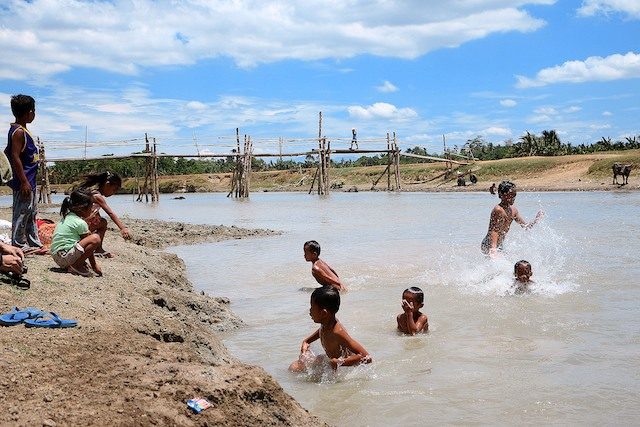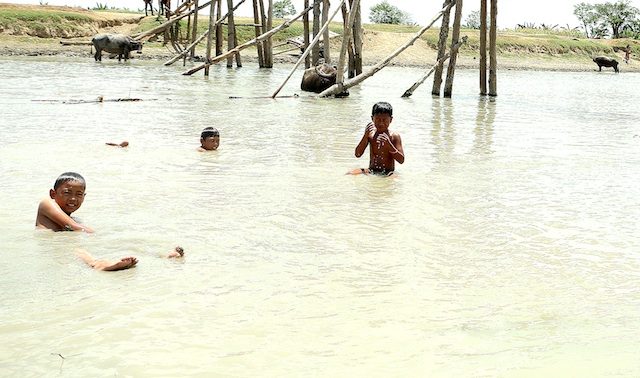SUMMARY
This is AI generated summarization, which may have errors. For context, always refer to the full article.

MAGUINDANAO, Philippines – With careful and calculated steps, we crossed the decrepit wooden bridge that squealed in protest against our collective weight. A river ran under us, spread like thick molten chocolate.
This was the bridge that stood witness to the bloodbath that ensued when armed members of the Philippine National Police Special Action Force (PNP SAF) stormed the village of Tukanalipao in Mamasapano, Maguindanao, to arrest Marwan or Malaysian terrorist Zulkifi bin Hir.
This was the bridge that saw how they fell one by one – Marwan, the police commandos, the rebels, the civilians, including 8-year-old Sarah Panangulon, a name, perhaps except for her family and friends, no one will ever remember a few months from now.
All the gunshots, the screams, the wailing, the grief and fear that overwhelmed the village – this bridge had heard and felt everything.
The aftermath of the tragedy in the village of Tukanalipao on January 25 remains fresh. It was a fateful day that, just like a bad dream, still haunts the villagers’ memory.
Just like what a resident – an elderly woman – said, the death of Marwan is a death the village will find too hard to forget.
“They got him and they got many others, including that little girl,” said the woman.
What followed was a mirage of faces and lives underlined by shadows of terror and uncertainty. But in the middle of all these, what it failed to weaken was the human spirit to hope and continue dreaming.
“It happened and we hope it will never happen again,” the woman said. “Right now, all we want is to have a fresh start and live in peace.”
The other Marwan
On Tuesday, March 31, under the wooden bridge in Tukanalipao, a boy also named Marwan frolicked in the river with his friends, wading through the lazy current while other happy children watched from the banks. The laughter of Marwan and his friends reverberated. Their skin glistened under the sun.

In an interview with 9-year-old Marwan Ismael, he expressed what other children his age usually care less about.
“Gusto ko lang na sana matapos ako ng pag-aaral at wala ng gulo dito (I just want to finish school and I hope that the conflict would soon be over),” he said.
Every day, Marwan and his friends would play at the bridge, a routine interrupted when the village was rattled by the police operation that targeted his Malaysian namesake and the Filipino associate, Abdul Basit Usman.
The bridge played a big part in daily life in Tukanalipao. It’s one of the “highways” farmers used to transport their products to the market.
Given its current condition, the Autonomous Region in Muslim Mindanao government intends to replace the wooden bridge with a steel one, allotting a P10 million budget. A P7.5-million budget will also be released for the construction of a farmers’ access road.
These moves, according to ARMM Governor Mujiv Hataman, is hoped to facilitate the transformation of the village. On March 30, Hataman offered scholarship grants to 10 of the best high school students of the village.
Hataman said it also his hope to see the children of Tukanalipao overcome the tragedy brought by the January 25 incident.
“Peace is possible and we can make it more possible for all the children of Mamasapano and the entire Mindanao,” he said. “We are one with the people as they demand peace in Mindanao. Napagod na po talaga tayo sa giyera (We are really tired of war).”
For the child Marwan, war would only make life harder for all of them.
“Kung may giyera, hindi kami makapagtanim at maka-harvest. Hindi rin kami makapunta sa paaralan. At aalis kami sa aming mga bahay (If there is war, it would be impossible for us to plant or harvest. Children will not be able to finish school. If there is war, we are forced to leave our homes),” he said. – Rappler.com
Add a comment
How does this make you feel?
There are no comments yet. Add your comment to start the conversation.